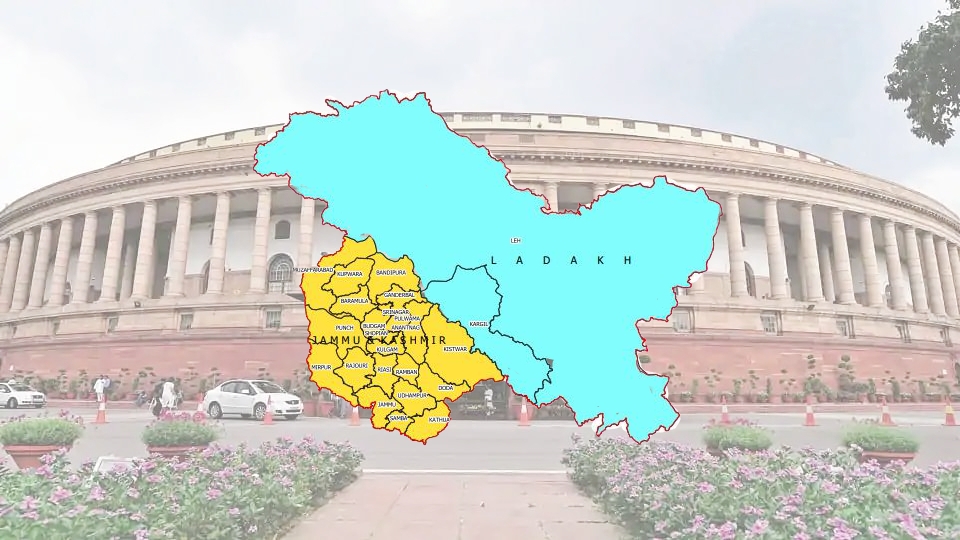
(This is the fifth article in the series in the run-up to the 2nd anniversary of the abrogation of Article 370. Other articles in the series can be read here -> Part 1, Part 2, Part 3, Part 4)
The long-standing ideological commitment of the Bharatiya Janata Party to undo Article 370 of the Indian Constitution was fulfilled in 2019. On August 5, 2019, the Indian Govt announced the abrogation of Article 370 provisions for the erstwhile state of J&K and the state was bifurcated into two Union territories of Jammu and Kashmir, and Ladakh and with the abrogation of the article, J&K lost its special status.
The Centre has ordered 37 central laws envisaged in the Concurrent List, from the list of 52 items given in the Seventh Schedule to the Constitution of India to be implemented in the Union Territory of Jammu and Kashmir. The adaptation of the central laws in the newly formed Union Territories with required modifications and amendments, will ensure administrative effectiveness and smooth transition and the order will further help to amalgamate the northern most state with the Constitution of India.
It would sound very interesting to know, before the repeal of Article 370 Indians outside the state of J&K could not buy any immovable property in Jammu and Kashmir unlike in other states or different parts of the country but a J&K resident could buy property anywhere in India, doesn’t it sound ironic ?
Equal rights to all
With the abrogation of the article there can be reservation for minorities in the state now as well, depending on the decisions taken by the newly formed state legislature. There would be equal rights to the religious minorities, emancipating Dalits and tribals and removing disabilities imposed upon women by law in Jammu and Kashmir, the Government has furthered the modernist and egalitarian vision which seeks the creation of a modern Indian nation.
All provisions of the Right to Information (RTI) Act will be enforced in the newly created Union Territory. Earlier, the duration of the state’s Assembly was six years. Now, it is going to be like any other state — five years.
The latest changes reversed the seven decade folly of the Nehru regime and have paved the way for non-residents to buy land in the union territory. Center notified Jammu and Kashmir land laws omitting ‘permanent resident’ as criteria and ending the exclusive rights of locals over the land.
The Kashmir conflict is a function of complex historical grievances, politico-ethnic demands, increasing Islamic radicalization, and Pakistan’s unrelenting interference in the Kashmir Valley. It would be simplistic to imagine that such a multi-layered and complex conflict can be resolved by the stroke of a pen effecting a constitutional change but it’s definitely a positive step towards integrating Kashmir and the valley with India constitutionally though the cultural integration would be long hard fought battle in the minds of state residents.
Here are the list of laws Under the newly introduced J&K Development Act:
1. The Advocates Act, 1961 (25 of 1961);
2. The All India Services Act, 1951 (61 of 1951);
3. The Ancient Monuments And Archaeological Sites and Remains Act, 1958 (24 of 1958);
4. The Arbitration and Conciliation Act, 1996 (26 of 1996);
5. The Census Act, 1948 (37 of 1948);
6. The Central Goods and Services Tax Act, 2017 (12 of 2017);
7. The Cinematograph Act, 1952 (37 of 1952);
8. The Code of Civil Procedure, 1908 (5 of 1908);
9. The Code of Criminal Procedure, 1973 (2 of 1974);
10. The Collection of Statistics Act, 2008 (07 of 2009);
11. The Commissions of Inquiry Act, 1952 (60 of 1952);
12. The Court-Fees Act, 1870(7 of 1870);
13. The Dentists Act, 1948 (16 of 1948);
14. The Family Courts Act, 1984 (66 of 1984)
15. The Government Securities Act, 2006 (38 of 2006);
16. The High Court Judges (Salaries And Conditions of Services) Act, 1954 (28 of 1954);
17. The Homeopathy Central Council Act, 1973 (59 of 1973);
18. The Immoral Traffic (Prevention) Act, 1956 (104 of 1956);
19. The Income-Tax Act, 1961 (43 of 1961);
20. The Indian Forest Act, 1927 (16 of 1927);
21. The Indian Medicine Central Council Act, 1970 (48 of 1970);
22. The Indian Penal Code, 1860 (45 of 1860);
23. The Insolvency And Bankruptcy Code, 2016 (31 of 2016);
24. The Limitation Act, 1963 (36 of 1963);
25. The National Co-Operative Development Corporation Act, 1962 (26 of 1962);
26. The Official Languages Act, 1963 (19 of 1963);
27. The Press and Registration Of Books Act, 1867 (25 of 1867);
28. The Press Council Act, 1978 (37 of 1978);
29. The Prevention Of Corruption Act, 1988 (49 of 1988);
30. The Protection Of Human Rights Act, 1993 (10 of 1994);
31. The Public Debt Act, 1944 (18 of 1944);
32. The Railway Property (Unlawful Possession) Act, 1966 (29 of 1966);
33. The Real Estate (Regulation And Development) Act, 2016 (16 of 2016);
34. The Representation Of People Act, 1950 (43 of 1950)
35. The Right to Fair Compensation and Transparency in Land Acquisition, Rehabilitation and Resettlement Act, 2013 (30 of 2013);
36. The Securitization and Reconstruction of Financial Assets and Enforcement of Security Interest Act, 2002 (54 of 2002) and
37. The Textiles Committee Act, 1963 (41 of 1963).
IT Professional
